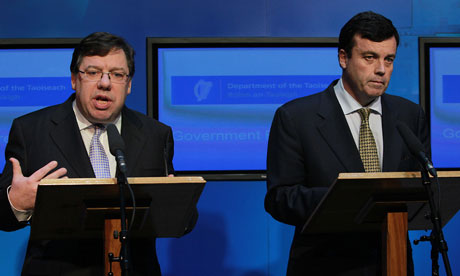Ireland asks for €90bn EU bailout
![]()
Three-year loan, mainly earmarked to rescue the Republic’s debt-ridden banks, will be handed over by the IMF and the EU
Henry McDonald in Dublin and Jill Treanor

British taxpayers face a multimillion pound bill to help bail out Ireland which last night asked for an international financial rescue package of as much as €90bn (£77.3bn), after seven days of denying it would need to succumb to the humiliation of a bailout for its crippled banking system.
The three-year loan will be handed over by the IMF and the EU, whose members last night agreed to support the climbdown by embattled Irish prime minister Brian Cowen.
Additional loans are also being considered by the UK and Sweden.
While the precise scale of the loan will be hammered out in the coming days, British taxpayers are likely to contribute in three separate ways – through the IMF; an existing EU mechanism; as well as a bilateral loan – all of which could amount to an estimated £7bn.
The chancellor, George Osborne, participated in a series of emergency calls with EU finance ministers yesterday evening after a dramatic day in which Ireland conceded, for the first time, that it could not tackle its ailing banking system without international help.
A Treasury spokesman said Britain – whose banks have £150bn of exposure to Ireland – would be “closely involved in discussions on the scale and type of assistance as they develop” while the EU and IMF made clear they were standing ready to arrange a loan.
Cowen addressed the Irish people last night, urging them to support the loan as he expressed gratitude for the support of the EU. When asked if he was culpable for the economic mess, he replied: “I will defend my position throughout my political career. I don’t accept your contention that I am the bogeyman you are looking for.”
The EU’s economic and financial affairs commissioner, Olli Rehn, spelled out the gravity of the situation that has gripped financial markets for weeks, forcing Ireland’s cost of borrowing to unsustainably high levels. “Providing assistance to Ireland is warranted to safeguard the financial stability in Europe,” he said. Ireland’s banks, who have already received €50bn, will be restructured to make them smaller.
Analysts believe nationalisation is likely for Allied Irish Banks. But anger was already flaring on the streets in Dublin . Police scuffled with protesters as they cleared the way for ministerial cars leaving an emergency cabinet meeting. One man was taken away by ambulance after being injured.
Earlier, Cowen tried to prove that the government had rung concessions out of the EU for the bailout, insisting that the question of increasing Ireland’s low rate of corporation tax rate “had not arisen”, despite speculation that his eurozone partners wanted to pare down the Ireland’s competitive advantage.
Brian Lenihan, the finance minister, had signalled the start of a historic day for Ireland earlier yesterday by admitting he was going to ask the cabinet to agree to make a formal request for aid, but he said the country had not been pushed into the request by EU partners worried about the future of the single European currency.
He characterised the money as a plan to Irish banks, which have been suffering outflows of deposits in recent months. He refused to put a figure on the total bailout but accepted it was tens of billions of euros and not a “three figure” sum.
In advance of yesterday’s cabinet meeting, Lenihan told state broadcaster RTE : “The banks were too big a problem for the country. The key issue all the time for the government is to ensure that we do not have a collapse of the banking sector.”
He described the IMF-EU money as contingency capital which, along with “structural reform” of the banks, would put them on the road to permanent recovery. Financial experts have said the banks need up to €70bn to create the kind of confidence needed in international money markets to stop the outflow of deposits from the banking system and ultimately allow Ireland to borrow money on the bond markets.
Officials will also be hoping the package created for Ireland will prevent contagion spreading throughout the eurozone. The €110bn Greek bailout was only six months ago, and many market watchers believe that Portugal, and possibly Spain, could be the next target for investors concerned about over-indebted economies.
The markets will be awaiting the details of a four-year economic plan tomorrow which is aimed at driving down the country’s deficit to 3% of GDP by the end of 2014 by cutting €15bn off state spending.
The lack of detail in the announcements was regarded as a likely source of volatility in the markets, and prompted speculation that Portugal and Spain may be the next countries to feel the heat of speculators.
Peter Chatwell, rate strategist at Credit Agricole CIB, said: “I don’t think this does anything to take Portugal and possibly Spain out of the firing line.
Related Articles
Las primas de riesgo se ceban con Italia y el Estado español
![]()
CRISIS DEL EURO SIN PRECEDENTESPese a la presión de los mercados, las discrepancias entre los países de la eurozona siguen
Clashes erupt in eastern Myanmar
![]()
Thousands of refugees cross into Thailand as fighting breaks out between anti-government fighters and troops. Thousands of Myanmar refugees have
Turkey says Iraq bombings aimed at stirring sectarian strife
![]()
Turkey has strongly condemned a string of bombings across Iraq on Wednesday, claiming that the nature of the terrorist attacks


